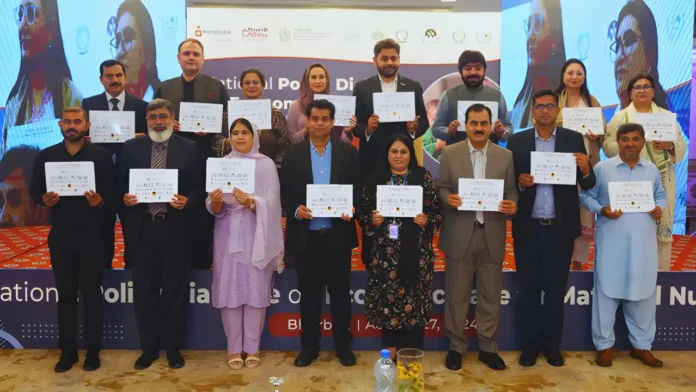
The Pakistani government, in collaboration with provincial authorities, has taken a decisive step to enhance maternal nutrition across the country, announcing a significant increase in funding dedicated to this cause.
This commitment was formalized in a joint declaration issued after the National Policy Dialogue on Maternal Nutrition, organized by the Federal Ministry of Health and Nutrition International.
The dialogue aimed to expedite the implementation of the “Pakistan Maternal Nutrition Strategy 2022-27,” ensuring comprehensive maternal care from pre-pregnancy to post-natal stages.
The joint declaration, endorsed by all key stakeholders, including provincial health departments from Punjab, Sindh, Balochistan, Khyber Pakhtunkhwa, Gilgit-Baltistan, and Azad Jammu & Kashmir, as well as international organizations like WHO, UNICEF, and the World Food Programme, emphasizes the urgency of integrating maternal nutrition into existing healthcare services and the Universal Health Coverage framework.
The declaration also highlights the importance of preparing and strengthening response systems to address the nutritional needs of women in emergencies.
During the dialogue, alarming statistics were revealed, showing that 41.7% of women in Pakistan suffer from anemia, 14.4% are underweight, and 24% are overweight.
These figures highlight the critical need for collaborative efforts to address maternal nutrition, which, if left unresolved, could lead to a generation of malnourished children and significant economic losses.
Dr. Fauzia Hanif, Deputy Director of Reproductive, Maternal, Newborn, Child Health and Nutrition, emphasized the importance of maternal health in societal development, stating, “The current indicators of maternal nutrition underline the immediate need for targeted interventions to break the intergenerational cycle of malnutrition.”
She called for collective and coordinated efforts among stakeholders to develop a comprehensive strategy based on the Costed Multisectoral National Nutrition Action Plan 2023-2030, which has already received preliminary approval.
Dr. Hanif expressed hope that this declaration would serve as a powerful testament to Pakistan’s ongoing commitment to improving maternal nutrition.
According to the Cost of Inaction tool developed by Nutrition International, anemia among girls and women costs Pakistan’s economy an estimated USD 595 million annually, equivalent to 0.2% of the Gross National Income.
Without intervention, this could result in 23.9 million new cases of anemia among girls and women each year.
Dr. Irfanullah, Deputy Country Director of Nutrition International Pakistan, highlighted the organization’s long-standing partnership with the Pakistani government, stating, “For over two decades, Nutrition International has been a key ally in improving the nutritional status of women, young girls, and children in Pakistan. Our efforts focus on providing essential micronutrient supplementation, strengthening healthcare providers’ capacities, and ensuring quality care for positive pregnancy outcomes and safe deliveries.”



